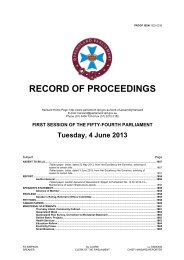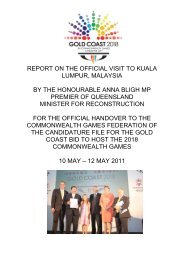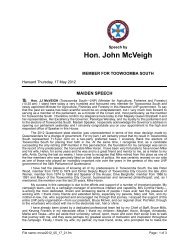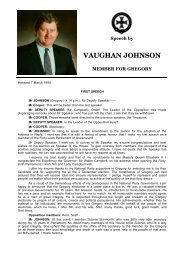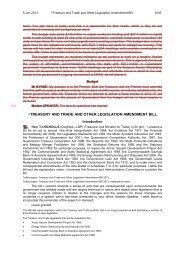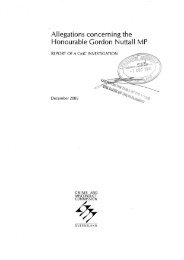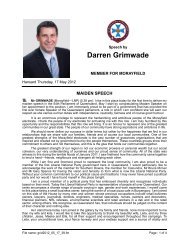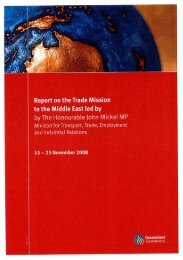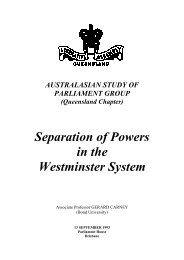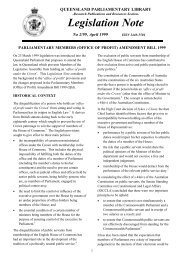weekly hansard - Queensland Parliament - Queensland Government
weekly hansard - Queensland Parliament - Queensland Government
weekly hansard - Queensland Parliament - Queensland Government
Create successful ePaper yourself
Turn your PDF publications into a flip-book with our unique Google optimized e-Paper software.
23 Aug 2005 Plumbing and Drainage and Other Legislation Amendment Bill 2621<br />
In Europe it rains a lot. This lends itself to particular types of gardening and particular types of<br />
agriculture that are absolutely and totally unsuitable in Australia. In this country we live in very arid<br />
conditions. We have, by and large, poor soil and we are very poor when it comes to the quantities of<br />
water available to us. That is why we need to conserve water in this country. This important piece of<br />
legislation does just that. This bill helps to save water.<br />
The <strong>Queensland</strong> government is working cooperatively with local councils to ensure that<br />
<strong>Queensland</strong> has a workable legislative framework that facilitates this process. The bill provides greater<br />
flexibility to local councils by allowing grey water use in garden irrigation.<br />
I believe that the member for Hervey Bay was quite correct when he spoke earlier in this House<br />
about people in this country not understanding the true value of water. I think it was Oscar Wilde who<br />
defined a cynic as a person who knows the price of everything and the value of nothing. I think it is fair<br />
to say that many Australians simply do not understand the true value of water. In this country, water is<br />
scandalously undervalued.<br />
The problem was identified quite adequately by the CSIRO. Its land and water unit explained that<br />
Australia’s major water resources are in northern Australia and Tasmania, whereas most of our<br />
agriculture and people are in south-eastern and mainland Australia. The CSIRO also estimates that the<br />
largest consumption of water in this country is in the production of meat and wool. It believes that<br />
production of a kilo of beef—and this is quite stunning—requires between 50,000 and 100,000 litres of<br />
water, while production of a kilo of clean wool requires a staggering 170,000 litres of water. The figures<br />
are even higher when one begins to factor in the amount of water that is lost through drainage and<br />
the amount of water that is required for delivery.<br />
Some of the crops grown in this country are major water users. The production of a kilo of wheat<br />
uses between 715 and 750 litres of water. The production of a kilo of maize uses between 540 and 630<br />
litres of water. Rice production uses far more—between 1,500 and 2,000 litres of water. Figures like<br />
these necessitate a serious debate and re-examination of whether we are properly using our water<br />
resources. I think these figures make it incredibly clear that we are not. The way in which Australians<br />
use water, quite frankly, is nothing short of silly. We need to improve this and to do that we need to<br />
educate people.<br />
I want to speak very briefly about a resource I visited in Sydney. It is a joint initiative of the City of<br />
Sydney and the Marrickville local councils. It is called the Watershed Sustainability Resource Centre. It<br />
is an absolutely wonderful facility which is situated on King Street in Newtown. A watershed is a ridge or<br />
crest line that divides two catchment areas. King Street, in fact, divides two catchment areas such that<br />
the rain that drains to the north of King Street flows to Sydney Harbour while the rain that drains to the<br />
south of King Street flows to Botany Bay. This area deals with some significant urban water issues and<br />
because of the way in which the drainage works, stormwater pollution is a major challenge.<br />
The reason this great resource was named the Watershed is that one meaning of ‘watershed’ is a<br />
definitive change or a turning point. Those involved believe that this initiative should provide an<br />
inspiration for positive action in the community and are working towards a sustainable future. They have<br />
set up a shopfront that provides not only resources but also some wonderfully experienced staff to<br />
advise on simple and cost-effective ideas that support sustainable ways of living and the sustainable<br />
use of water.<br />
One thing that struck me—and I did not fully understand it until I had visited the Watershed—is<br />
the problems that can arise if local authorities do not appropriately regulate grey water use. After a lot of<br />
rain, a very nasty situation can arise where the local area becomes, quite simply, waterlogged with the<br />
type of water one does not necessarily want bubbling back up through the garden. That is why the<br />
legislation now before us provides councils with an appropriate way of regulating grey water use in<br />
<strong>Queensland</strong>.<br />
I suggest that members who visit the City of Sydney web site should look at the Watershed<br />
Sustainability Resource Centre. It is the sort of facility that local authorities throughout <strong>Queensland</strong><br />
should invest in. It is a wonderful initiative and one that I would love to see replicated throughout<br />
<strong>Queensland</strong>. This is a wonderful piece of legislation and I am delighted to support it.<br />
Ms CROFT (Broadwater—ALP) (6.19 pm): It is my pleasure this evening to rise to speak in<br />
support of the Plumbing and Drainage and Other Legislation Amendment Bill 2005. I know that<br />
residents, particularly at my end of the Gold Coast, have been concerned for some time about our ability<br />
to conserve water and the issue of drought on the Gold Coast. Mr Speaker, I know that, coming from<br />
Mount Isa and the outback, you, like I, would have had instilled in you that you shower quickly, that you<br />
do not waste any water and that if your grass is bone dry it does not matter as long as you do not waste<br />
any water.<br />
On the Gold Coast people try to keep their gardens green. They like to wash their cars to keep<br />
them clean. Over the last couple of years we have had to adhere to very strict restrictions that were<br />
enforced by the Gold Coast City Council. A number of people have come up to me during my mobile<br />
office meet-and-greets asking about the possibility of introducing the use of grey water and how they<br />
could use that to reduce their use of water and reduce the cost of their water use.



